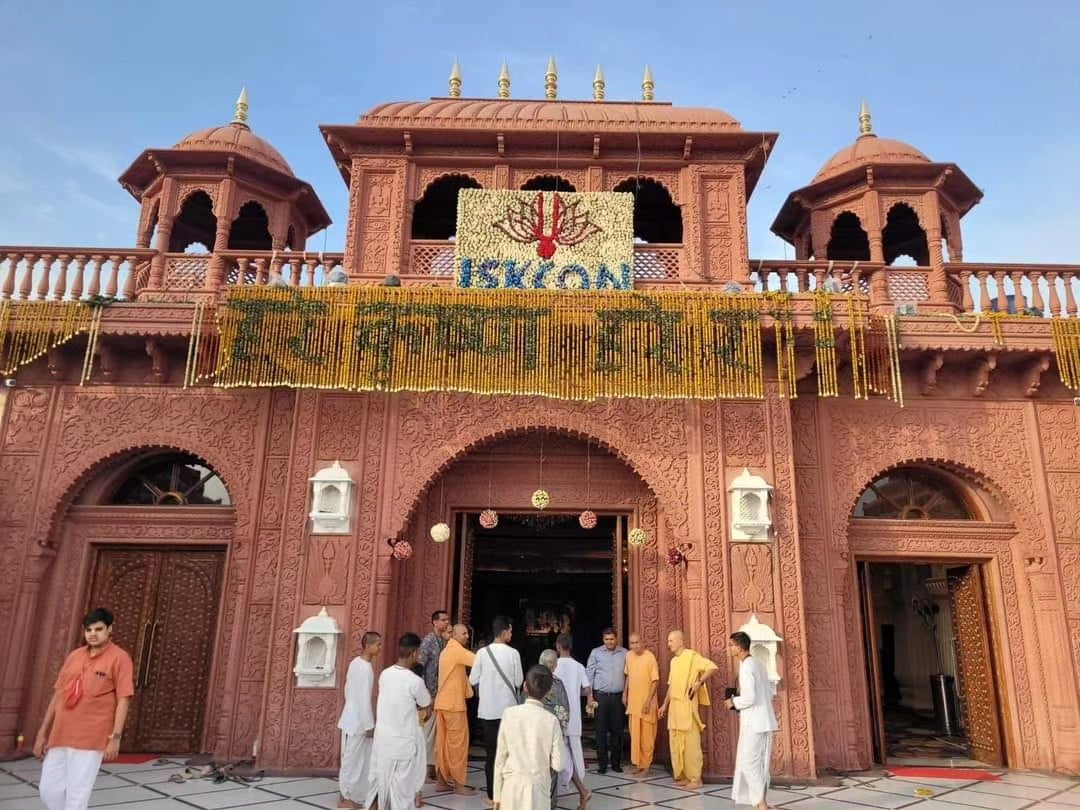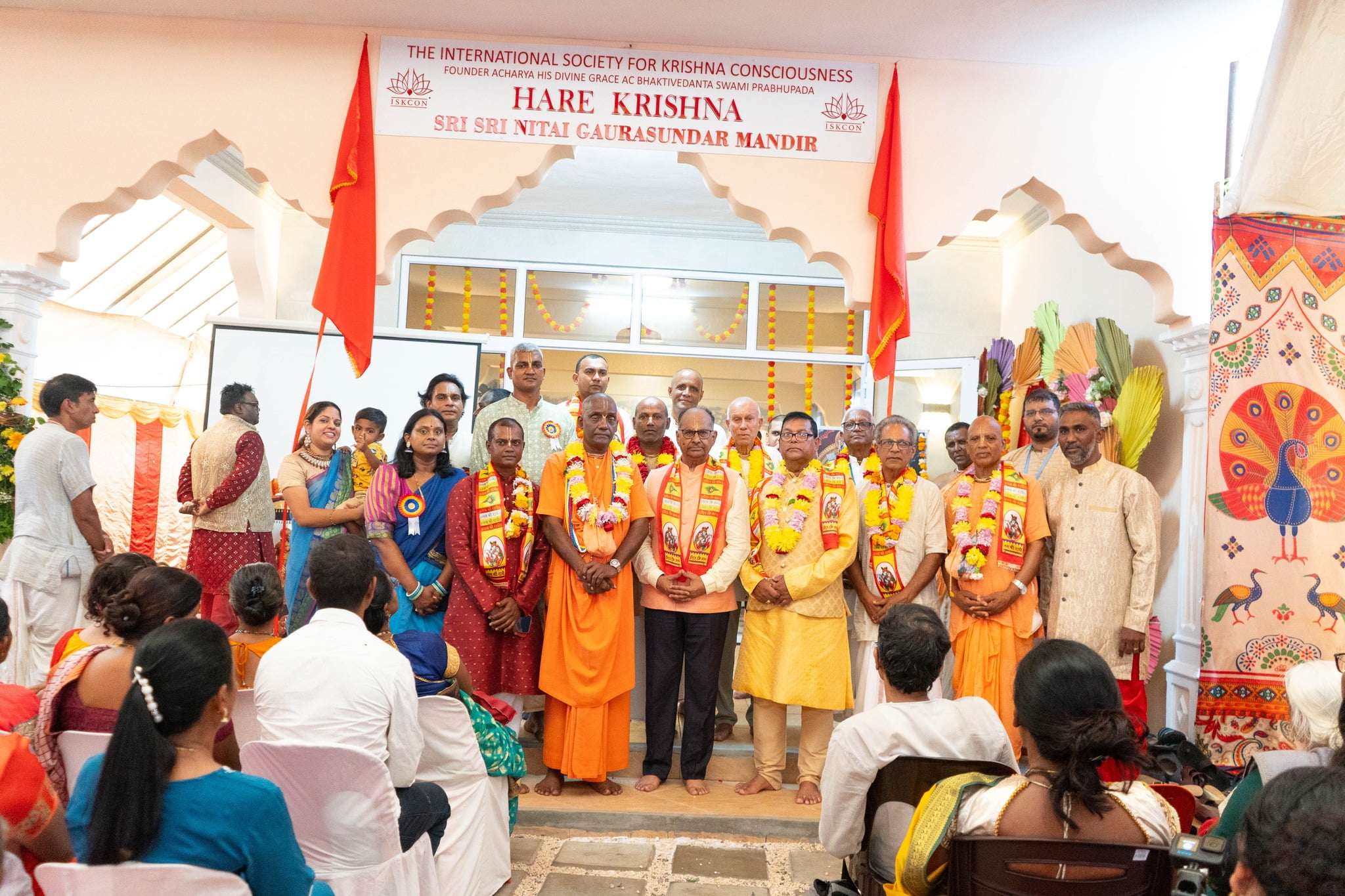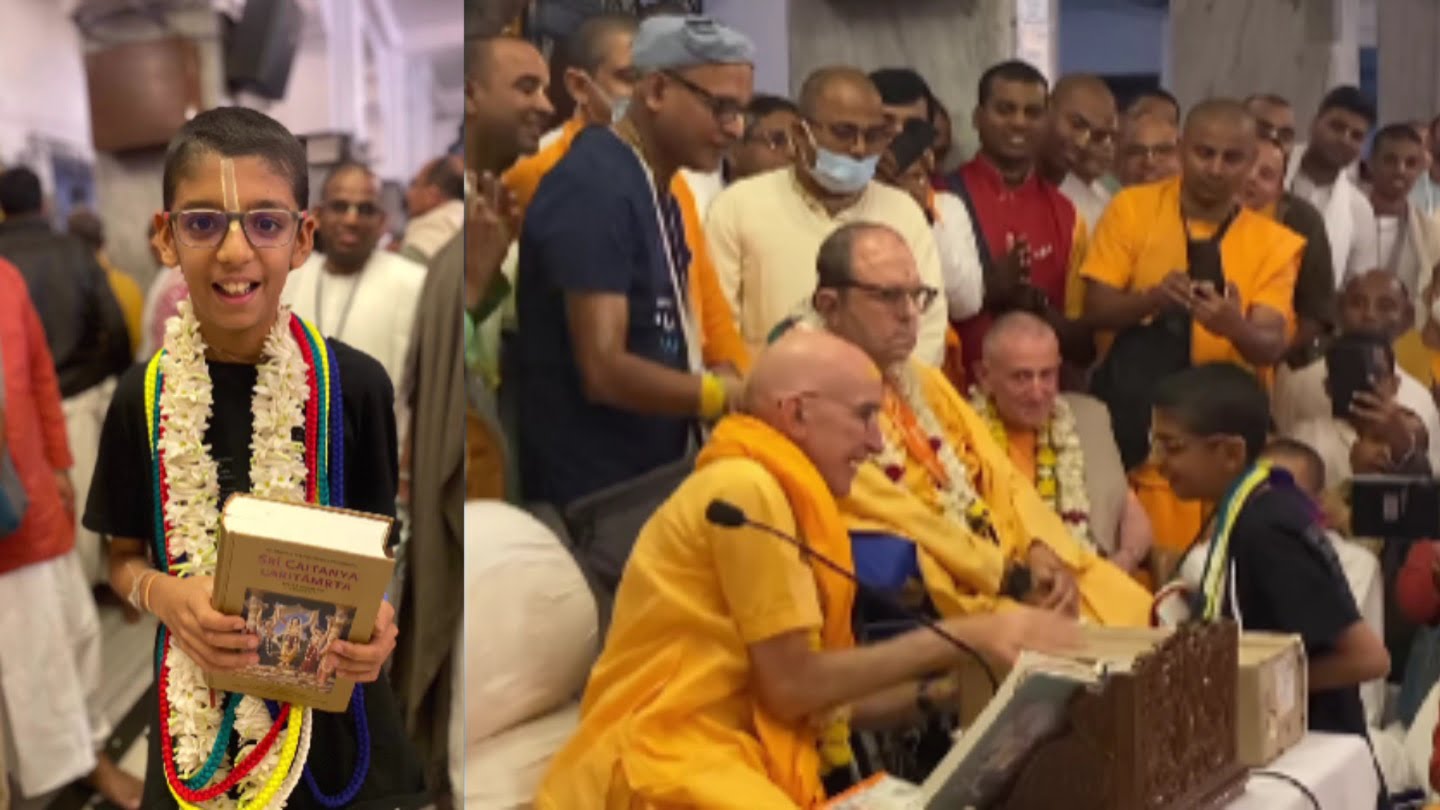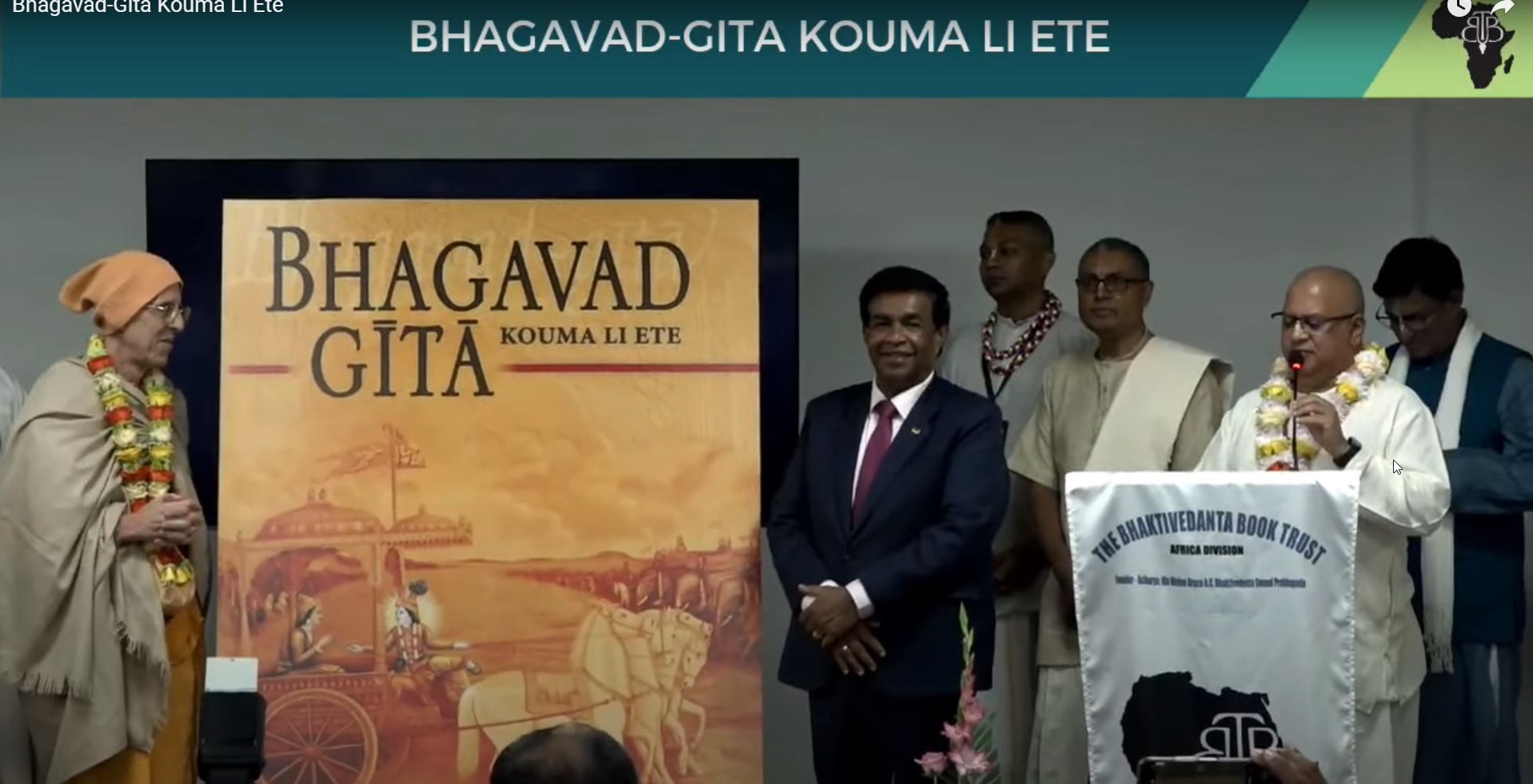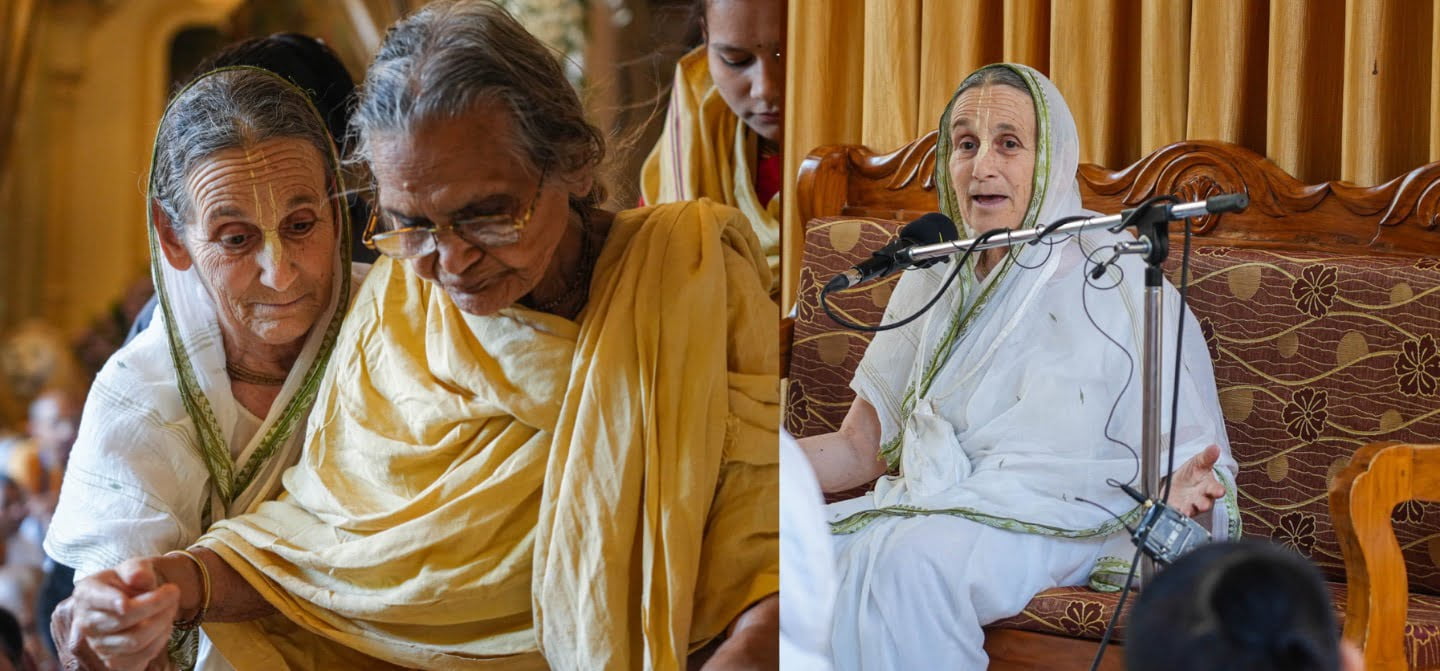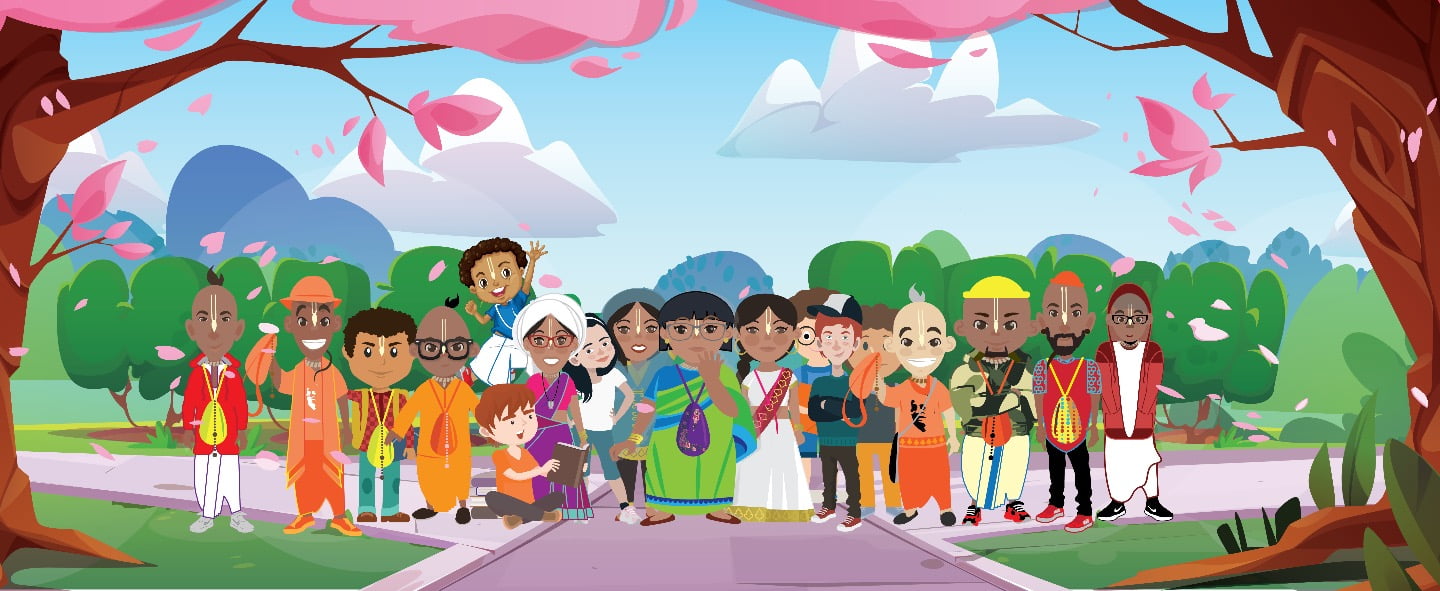Draupadi – Dishonored Yet Honorable
By Chaitanya Charan Das | Jan 09, 2016

Draupadi. Her admirable character is revealed in the most humiliating incident of her life – her disrobing by the wicked Dushasana. Though victimized in body, she refuses to be victimized in her heart. Her exceptional character transforms the lowest point in her life into the highest point. The incident in which she is the most dishonored, she emerges as the most honorable.
On that dark day, her period has just ended and she has emerged after bathing, wearing a single cloth before she puts on her royal dress as the chief queen of the reigning monarch. Unknown to her, the monarch Yudhisthira has, in a rigged gambling match, lost everything, including all his property, his brothers, himself and finally her.
The jeering Karna suggests that Draupadi be brought into the assembly and be disrobed publicly for she was now the Kauravas’ slave. If the Kauravas had succeeded in disrobing her, whether they would have physically violated her in the public assembly is doubtful. The atrocious idea was not just driven by lust but by power play – the Kauravas saw Draupadi not as a person, but as a tool to demean the Pandavas. Objectification of women runs through and through in the Kauravas’ attitude. They order a court messenger to summon Draupadi to the palace.
When the messenger informs her that she has been summoned to the assembly and tells her all that has transpired there, she is aghast. But pulling herself together with amazing speed, she comes up with a strategy to buy time. She tells the messenger to ask the assembly whether she had been rightly gambled and lost when Yudhishtira had already gambled and lost himself – when he was not his own master, was he her master to have gambled her?
While the fact that Yudhisthira gambled Draupadi might suggest that women were treated as property and were thus objectified, the sequence of the events reveals a much more nuanced reality. Yudhisthira gambles her after he has gambled himself, whereas he gambles all his property before. So Draupadi, even if she is considered to be his property, is of a drastically different level than all the objects that were his property – she is more precious than not just all those things, but more precious than he himself. Rather than using the word ‘property’, the right word is ‘belonging.’ In love, the two lovers often say two each other: “You are mine; you belong to me.” Such statements by a lover makes the beloved feel valued, treasured, cherished.
When the messenger conveys Draupadi’s message to the assembly, the Kauravas demand that Draupadi come and ask that question herself. When she asks again through the messenger whether the righteous assembly had actually summoned her, a chaste woman to come in her condition to appear in public, Dushasana goes to her palace and drags her by her hair.
Draupadi, though distraught, offers her respect to the assembly and requests that it answer whether she still belonged to Yudhisthira if Yudhisthira was not his own master. Bhishma confesses his confusion over two principles saying that a wife always belongs to her husband, whereas nothing belongs to a slave. No one in the assembly offers any other opinion except Vidura who is paid no heed. It seems that the whole assembly got caught in a technicality about dharma and ended up condoning a travesty of dharma. The bhakti tradition calls such an error as niyamagraha – sticking to the letter of the law while neglecting its spirit. In this case, the real issue was not whether a woman belonged to her husband or not – the real issue was how could honorable men stay silent when an honorable woman was so egregiously dishonored.
Duryodhana, enjoying the Pandavas’ fury, tries to pit wife against husband by announcing that if Draupadi admits that dharma-raja Yudhisthira had violated dharma by gambling her, he would release them all. She doesn’t take Duryodhana’s bait. She refuses to cast any blame on her husband, not because he is blameless – which he certainly isn’t – and not because she is so foolish or so madly in love with him as to not see his mistake, but because her sense of honor inspires her to stand by her loved ones in public. Just because we are let down by others doesn’t mean that we have to let them down. She answers that if it had been Yudhisthira’s choice he wouldn’t have gambled at all – he had gambled only because his elders had instructed him to. The onus was on those elders to decide what was right. Draupadi is holding on to straw and she probably knows it. But when straw is all that there is to hold on to, then it needs to be held on to firmly.
Vidura has been forcefully opposing the outrage, but his words have fallen on deaf ears. The disrobing is so heinous an act that it triggers dissension among the Kauravas. One of Duryodhana’s brothers, Vikarna, rises and asks the assembly to respond to Draupdi’s question. When no one responds, he offers his own opinion, pointing out three flaws in the gambling match: it was improper because Yudhisthira had been pitted against a trained gamester; Yudhisthira had been first compelled to gamble by his elders’ instruction and later incited to keep gambling till the gambling went far beyond civilized limits; and he had lost himself first, so he was in no position to stake Draupadi. The assembly applauds Vikarna, but Karna crushes the dissenting Kauarva, mocking him as a child who doesn’t know morality. Rather than rationally refute Vikarna, Karna inexplicably chooses to fight dirty by assassinating Draupadi’s character, calling her a prostitute for having married five men.
A prostitute sells her body to gain money. Draupadi’s polyandry was certainly unusual, but it had nothing to do with what a prostitute does. She had got five husbands not due to any of her doing but due to the actions of her elders and ultimately the imperatives of forces greater than human.
For his grievous insult to an honorable woman, Karna deserves the censure of anyone who has the slightest respect for women. That the insult had no basis in fact makes it so much worse.
With Vikarna silenced, Duryodhana asks his brother Dushasana to strip Draupadi. She resists desperately, but she is no match to that huge brute. Raising her hands in supplication to her Lord, Krishna, she begs him to rescue her from sinking in the Kaurava ocean. By Krishna’s mystic power, her saree becomes endless and Dushasana keeps pulling her saree and gets exhausted, but Drauapdi remains covered.
The whole assembly applauds Draupadi’s chastity that has attracted such supernatural protection and they censure the Kauravas for dishonoring such a virtuous lady. This incident of Draupadi calling out to Krishna and being rescued by her Lord who incarnated as the endless saree has been immortalized by the bhakti tradition through architecture and literature, poetry and imagery, prayer and song.
Krishna’s supernatural intervention is significant, but it shouldn’t detract from the strength of character that Draupadi exhibits throughout the incident. It is her devotion, her spirituality, that has given her that strength of character and that foundational devotion also gets its culminational expression in her helpless prayer to Krishna and his miraculous rescue.
Significantly, the Mahabharata doesn’t dwell for long on the supernatural intervention – it resumes its describtion the natural interaction among the characters. This is not surprising because the Mahabharata’s focus is on the question of what is dharma, and the answer centers on how we act, not how God responds.
Curiously but perhaps unsurprisingly, their inability to disrobe Draupadi doesn’t make the Kauravas give up their evil disposition – it just makes them suspend their intention to disrobe Draupadi. Rather than seeing that they are doing something wrong or that they might be angering higher powers by their misdeeds, they simply change their plan.
They keep insulting the Pandavas and Draupadi. And then they decide she should go to the maids’ quarters and start sweeping the Kauravas’ palace.
As the Kauravas keep hurling insults at the Pandavas and their wife, other inauspicious omens occur. Vidura warns Dhritarashtra that such omens portend the destruction of the Kuru dynasty and implores him to stop the adharma that is provoking such reactions.
The king is jolted out of his stupor on hearing that his sacrificial fire, which he had kept lit throughout his life has gone off. Coming to his senses, he attempts a last moment damage minimization. He lauds Draupadi for her chastity and courage, and tries to minimize the Pandavas’ anger with sweet words.
The baldness of his lies would have attracted laughter had the situation not evoked such horror. He says that he had called the gambling match just to test the skills of the two cousins. The question begs itself: How were the Kauravas’ skills tested by having Shakuni gamble for them? It’s like a person who invites someone to a friendly boxing match and then has Mike Tyson play in his stead and has Mike Tyson fight with a win-at-all-costs take-no-prisoners attitude.
Still, when Dhritarashtra asks Draupadi for some boon, she asks for the release of her husband – not Arjuna who had won her, but Yudhisthira who had lost her.
Even in the closest of relationships, we all commit mistakes, and most of us do have conscience that makes us feel bad when we act badly. That pinch of conscience alone is enough for sensitive people to correct themselves. But when those who are hurt by our mistakes put salt on our wounds by their harsh words, that additional threat often puts us in an ultra-defensive mode instead of a self-corrective mode. Draupadi resists the temptation to put any salt on Yudhisthira’s wounds and helps the mortified king regain his dignity.
Dhritarashtra tells her to ask for some other benediction. Draupadi asks that all her husbands be released along with their weapons, saying that with those weapons they would regain everything else. The king says that he is not satisfied and tells her to ask for more benedictions. When Draupadi declines, quoting an ancient standard forbidding kshatriya woman from asking more than two benedictions. The king in a rare display of magnanimity returns the Pandavas everything they had lost. (Later they are recalled for another gambling match after which they are exiled to the forest.)
Karna can’t tolerate this foiling of the scheme to dishonor the Pandavas.
Fanciful retellings of the Mahabharata depict Draupadi and Karna having a secret, unfulfilled love for each other. They couldn’t have got the Karna-Draupadi relationship more wrong. What kind of lover would suggest that his beloved be stripped in public?
The moment when the Pandavas regain what they have lost is Draupadi’s one moment of dignity in a nightmare of indignity. And yet Karna cannot let her have even that much. He can’t resist taking a potshot at the Pandavas: here are the warriors who were saved by a woman. His words reveal an utterly demeaning attitude towards women as if they are good for nothing and if they are good for something, then that makes the men good for nothing.
In this incident, Draupadi is undoubtedly the heroine – she emerges the brightest. The character who emerges the darkest is not Dushasana, although he gets immortalized infamously as Draupadi’s disrober. The darkest character is not Duryodhana, whose exhibiting his bare thigh to Draupadi eventually leads to his death through the breaking of that very thigh. The darkest character is Karna. He emerges the darkest not just because he behaves so badly, but because such depraved behavior is so shockingly out-of-character for him. To his credit, he regrets his actions, as he admits in later parts of the Mahabharata while speaking to Kunti and then to Bhishma. In contrast, there’s no indication in the Mahabharata of Duryodhana or Dushasana regretting their vile deeds – their only regret was that they couldn’t dishonor the Pandavas and Draupadi as much as they would have liked to. Just as in the Ramayana Kaikeyi acts reprehensibly due to Manthara’s association, so too does Karna act reprehensibly by Duryodhana’s association, being driven by the desire to please that debauched prince.
Draupadi’s mystical rescue by Krishna is often seen as the highlight of this incident. An equally, if not more, important feature is Draupadi’s consistent strength of character. That mystical rescue is not usually available for those threatened or dishonored. But what redeems Draupadi is not just the mystical rescue, but her steely resolve throughout the incident. Within her frail female form runs a spine of steel that stands erect throughout. That steely resolve is something that all women, and indeed all of us, can aspire for, no matter what indignity the world subjects us to.
Certainly, society needs better systems for the protection of women. Today when such systems are often found distressingly inadequate, this ancient incident when the system of protection utterly fell apart speaks to all of us. Draupadi reveals the strength that comes from one’s innate dignity, by sheltering one’s identity not in one’s feminity, but in one’s spirituality.
Who can not admire such character and admire the character with such character?



